New York City, May 10, 2015
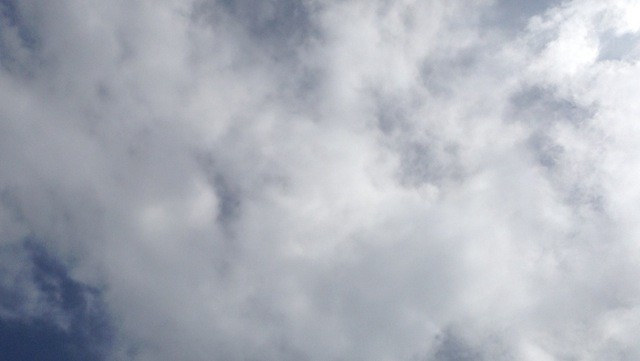
★★★ Sticky fog came in through the open windows. On the night air there had been sirens and a soprano, but by day there was just the stickiness, even as the fog visibly faded and gaps of blue opened in the glating sky. The peanut-butter bonbons were slumping out of shape. The clouds and the world below cohered and came into focus. Street-fair smells traced the way along Columbus. The three-year-old would stare so intently at motorcycles in traffic that he wod walk headfirst into a scaffolding pole. The stove was hot enough to say one was slaving over it. A man — a first tenant? — walked barefoot along the roof deck of the not-quite-finished apartment tower and sat down on one of the newly arrived blue outdoor couches, with a bottle of something the color of rosé and two glasses. He hunched forward in the sunlight, leaning over his moble device.
DMA's, "Laced"
“But none of these acts seems so poised to appear on the cover of NME circa October 1995 as Australia’s DMA’s.” Sure, let’s give it a shot.
Chinese Whisperers
by Jiayang Fan
A photo posted by SJP (@sarahjessicaparker) on May 4, 2015 at 8:11pm PDT
During my first October in the United States, soon after my mother and I had emigrated from China, I was told about a very peculiar holiday: The American Ghost Holiday, as it was translated to me, involved an elaborate process of sartorial selection and anxiety-inducing performance. Acquiring a costume could be expensive, and there was very little payback — a handful of dollar-store candies, if you were lucky. To avoid spending money on a costume, my mother went “shopping” in the leather suitcases that we had recently lugged across the Pacific. The day before my “performance,” she excitedly dug out a tracksuit with a Chinese flag stitched onto the chest and matching tangerine orange pants. “What was I supposed to be?” I cast a doubtful eye. “Chinese!” my mother proudly beamed.
Last week, I was reminded of the experience while scrolling through photographs from the Met Gala. The annual benefit, which kicks off the spring exhibit at the Costume Institute, is a strange jubilee for celebrities, cultural luminaries, and meticulously-screened A-listers. Aside from raising a record-breaking amounts of money each year — twelve million dollars in 2014 — it’s the premiere party of the season, where scrupulous primping is elevated to an Oscar-level spectator sport. Every year, the style of the attendees’ attire is pegged to an exhibition at the Met. In 2003, it was the year of the goddess; in 2009, “The Model As Muse” honored fashion models in a splendid nod of unironic solipsism; and in 2013, tribute was paid to punk, as a a haute-chic reinvention of spiky mid-eighties grunge. This year, the theme is “China: Through the Looking Glass.”
The theme, as Andrew Bolton, the show’s curator, explained to Woman’s Wear Daily, is about “the West’s interest in China” and “China’s cultural influence on the West.” The “costumes and decorative arts crystallize centuries of cultural interchanges between the East and the West,” and the exhibition, which encompasses thirty thousand square feet and one hundred and forty haute couture pieces, “is infused with fantasy and nostalgia and romance,” he added. What is created is “a virtual China, a mixing of these anachronistic styles, which results in this pastiche.”
Pastiche is the operative word here. The exhibition was originally named “Chinese Whispers,” after the British parlor game in which a message is whispered around a circle until it is completely distorted. It was renamed, presumably because a sharp-witted event planner realized its potential to ignite a public relations firestorm and propel the intended pastiche into graceless parody. But the best brand manager could hardly have been expected to anticipate the outfits in attendance, which resembled nothing so much as visual rounds of Chinese Whispers gone awry: Chloe Sevigny arrived in an off-the-shoulder grotesquerie of sapphires, chokers, and over-embroidered pagodas; Carolina Kornikova wore a confused Hanfu that looked like it was missing a skirt; and Emma Roberts, who brought a dragon clutch, seemed to have been left off the memo to avoid chopsticks in the hair. Cherry blossoms, cheongams, and dubious headdresses, of course, were on ample display. Amal Clooney braved the mob by fortifying herself with breastplates that evoked the bloodied cuirass of a fashion-forward terracotta warrior. Rihanna looked like she had invaded the closet of an obese, obdurately cold emperor; Sarah Jessica Parker seemed to have raided the same gilded chiffoniers, with only the empress’s flaming headdress in tow.
Before the last celebrity had stepped inside, backlash, rife with accusations of misappropriation, came raining down. “I’m expecting someone to come out and scream ‘CHING CHONG CHANG,’ ” David Yi, a Korean-American journalist, said on Twitter. Meanwhile, millions of Chinese Weibo users weighed in with 2.5 billion tweets, many of which echoed the sentiment of one user: “Foreigners with Chinese style don’t fit very well, huh?” A college student from Wuhan was less equivocal: “Really, are the Americans admiring or actually mocking us Chinese?”
In other words, the fete, which ostensibly attempted to pay homage to the “intensifying” fascination with China, seemed oblivious to its doomed mission by the illogic of its form. True, the Met Gala is meant to be a tribute, not a treatise. Yet a considered treatment of a subject like China — which does not lend itself to the kind of artistic tribute akin to ones of iconic fashion designers like McQueen (2011) or Schiaparelli (2012) — is a near impossibility. A country — one that has been frequently exoticized in the the Western imagination — encompasses a vastness, complexity, and a conflicting sense of self, that in its convoluted multiplicity, turns the very concept of ballroom (carnival?) theme into farce. As the critic Veronique Hyland pointed out in her review, for a show that bills itself as a celebration of Chinese design, “the larger cultural implications are often stripped away.” The gala, in its effort to ostensibly promote China, similarly corrupts its coherence of culture.
That a night of innocuous celebration becomes a convenient target for accusations of overt offense is probably unfair. But the troubling phenomenon of commercializing the anesthetized fantasy of a country is worth examining. What is the value of “virtual China” when the brand marketing on display perverts any thoughtful consideration of China’s history and meaning?
The red carpet is no Halloween parade, but it is a costume contest of sorts. Twenty-two years ago, my get-up earned me enough snickers from my eight-year-old peers for me to know, with heated cheeks, that I screwed up a ritual, both trivial and somehow sacrosanct. Witches, ghosts and the dictate to wear something original and unusual eluded my mother, but as a participant in the spectacle, I worried that my gym suit did not exactly constitute a costume. (I was right.) “But the idea of it is what’s original,” my mom responded, impertinently resistant, it seemed to me, to the spirit of the holiday. “Nobody should be wearing a costume to look Chinese.” (She was right.)
The Best Moments from 'Fresh Off the Boat'
by Awl Sponsors
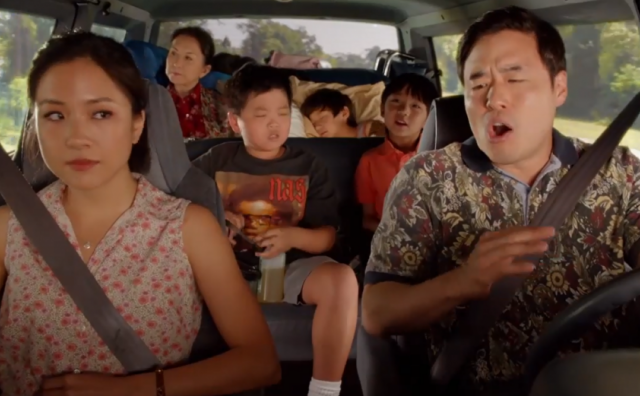

This post is brought to you by Hulu. Don’t be left out of the conversation! Be sure to catch up on the episodes of Fresh Off The Boat and Saturday Night Live.
Fresh Off The Boat’s only had thirteen episodes, but it’s already one of the funniest and most charming comedies on television. It’s the first sitcom to star an Asian-American family since Margaret Cho’s All-American Girl ran for just one season in 1994, so the expectations were sky high and kind of nervous, too. But Fresh Off The Boat is confident, consistently delivering hilarious jokes and touching family moments alike.
If you’ve missed any of them, now’s a great time to catch up or give it a go on Hulu !
Also, the show takes place in the mid-nineties, but somehow manages to incorporate ’90s nostalgia without feeling like a “10 Far Out Things Everyone Totally Remembers About the ‘90s” listicle — though to be fair, they are generally far out, and I totally remember them from the ’90s. Like how much of a bummer people who discovered grunge were for a while:
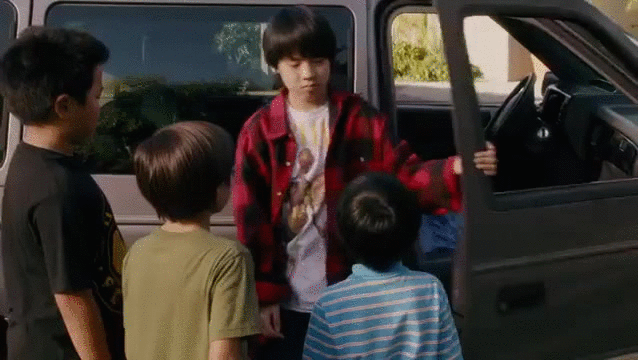
Or any of the jams hip-hop fanatic Eddie (Hudson Yang) treasures, as seen from his impressive collection of concert shirts to his equally impressive dramatic entrances:
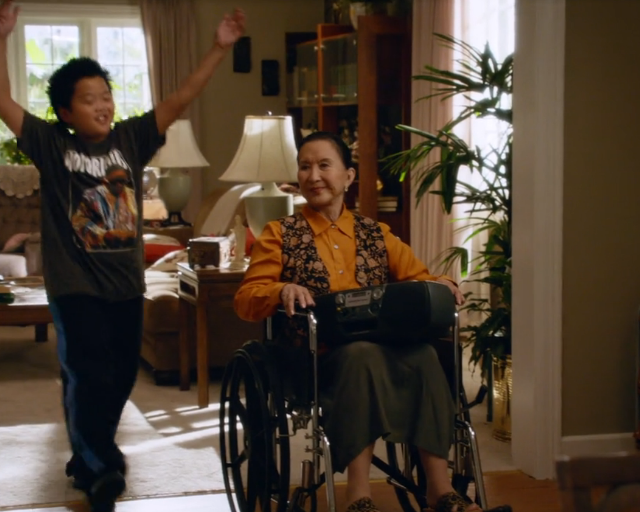
Or waiting so long for dial-up internet that you could do a lap/make a sandwich/kill a Tamagachi before it connected:
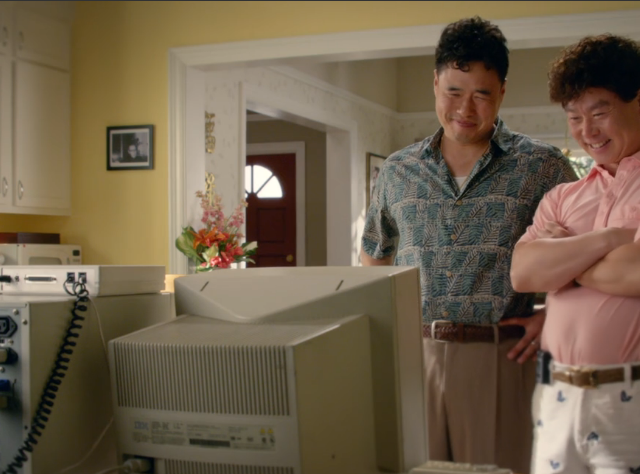
I don’t think a 9 To 5 video game was a thing in the ’90s, but I need to acknowledge it, because it sounds amazing:
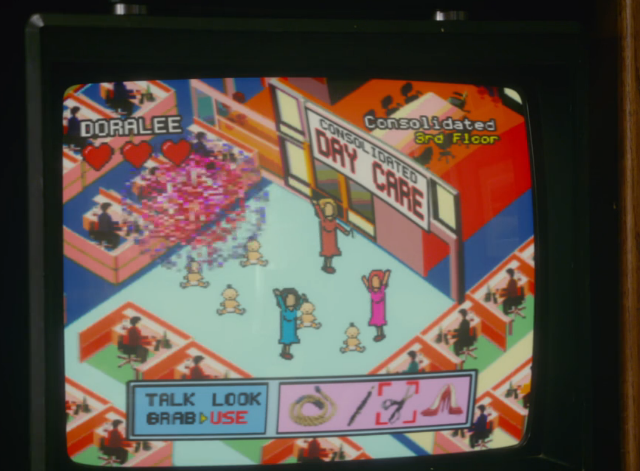
(I’m still waiting to see a binder plastered in Lisa Frank stickers, but that’s just another reason to hold out hope for season two.)
One of the best episodes even focuses on Eddie trying to get to a Beastie Boys concert. In true Fresh Off The Boat fashion, though, the story also taps into a poignant truth that an all-white show couldn’t touch. Eddie’s forced and eventually failed friendship with the only other Chinese student in school (Trophy Wife’s Albert Tsai) shows how majority white schools tend to group minority kids together based on nothing more than their shared ethnicity.
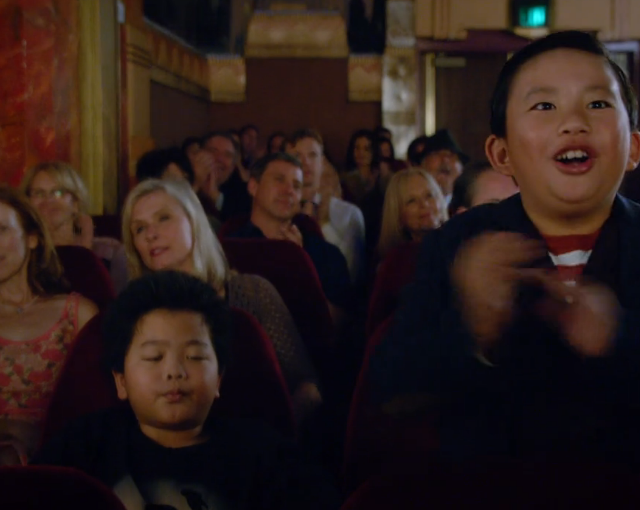
As it turns out, not all Chinese kids are into the same things just because they’re Chinese! Who knew!
So while race isn’t the driving factor for every story, Fresh Off The Boat definitely doesn’t shy away from talking about it. This might seem obvious, since it’s called Fresh Off The Boat (as inspired by chef Eddie Huang’s memoir of the same name), but it’s still refreshing to see a non-white family struggle with racism and assimilation alongside usual sitcom plots like “how to tell white lies” or “how not to coach your kid’s basketball team.” There are the sillier moments, like when family comes to visit and Eddie’s parents get “success perms” to prove they’re doing well:
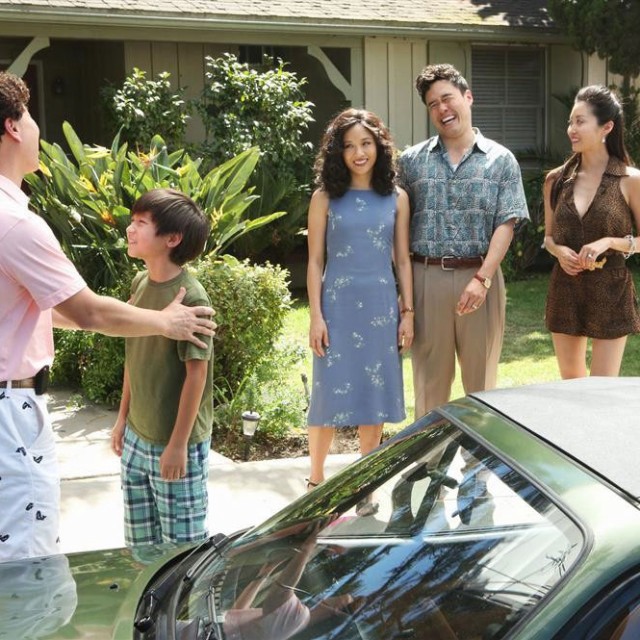
Or Eddie’s mom Jessica worrying so much about losing their Chinese culture that she accidentally dresses like Chun Li from Street Fighter:
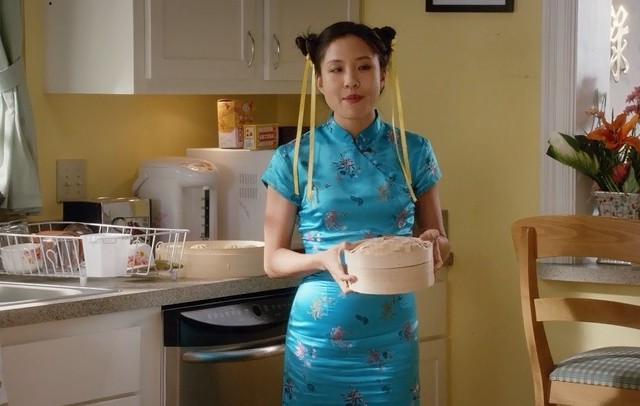
Then, there are the more serious moments. One of the most rewarding moments to date happens in the very first episode, when Eddie gets into a fight with a boy who calls him a “chink.” It doesn’t look good for Eddie when the principal calls in his parents — until they stick up for their son and demand to know why the other boy isn’t in the office for using the slur in the first place.
Ultimately, the heart of this show is its incredible cast of characters and actors. The children aren’t just ridiculously adorable, but they’re better than kid actors have any right to be, and the writers take full advantage of it. In addition to Hudson Yang as Eddie, there are his brothers Emery (Forrest Wheeler) and Evan (Ian Chen), who only need a single scene to steal an entire episode. While Emery is the deadpan ladies man and Evan is just…well, the cutest, their best and most delightfully absurd moments always happen when they’re together. Like when Evan got the chicken pox and spent half an episode coming for Emery like the drowned girl in The Ring:
Randall Park (The Interview) is Louis, the father with has big dreams of supporting his family with a wildly successful barbecue restaurant.
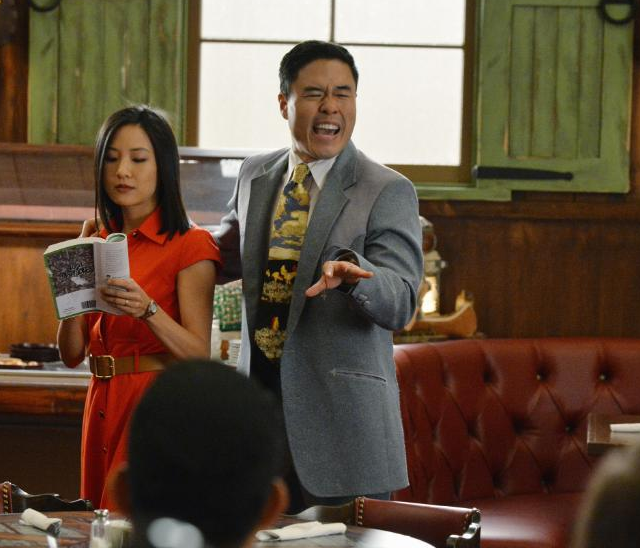
Louis is an eternally optimistic dreamer — at least until you take away his lucky jade.
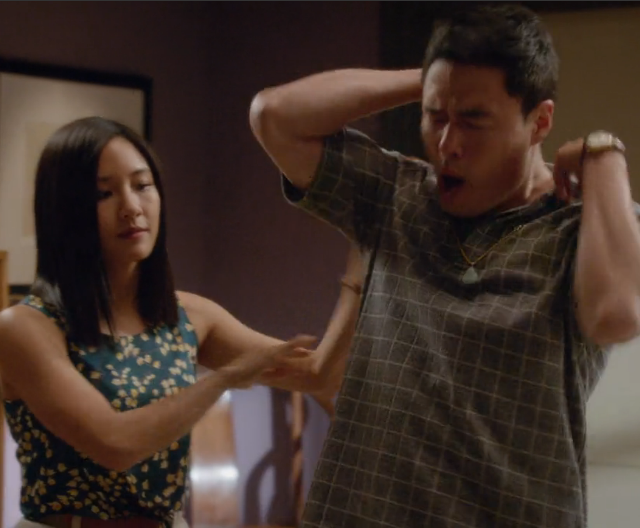
And then there’s Constance Wu as matriarch Jessica. You might have already heard how perfect they both are, but that’s only because they are perfect.
Jessica also builds herself a real estate career from scratch in record time:
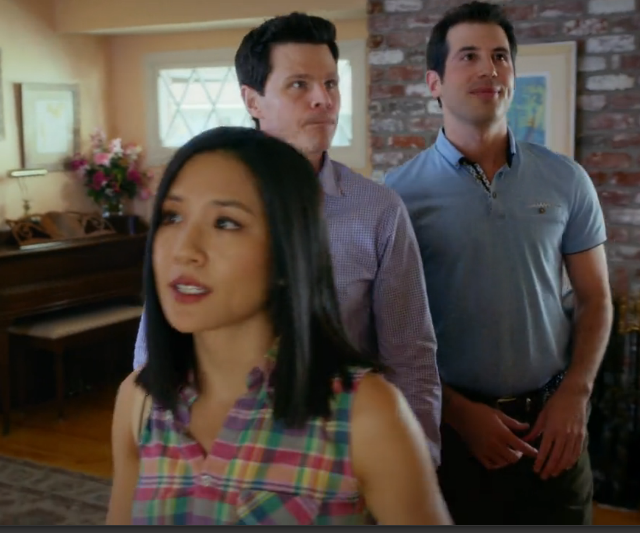
Jessica is stubborn, fiercely protective, and always confident she knows best even if her obvious superiority isn’t always acknowledged.
I do, Jessica. I really, really do.
This post is brought to you by Hulu. Don’t be left out of the conversation! Be sure to catch up on the episodes of Fresh Off The Boat and Saturday Night Live.

Come On Barbie, Let's Go Harley
by Matthew J.X. Malady
Twenty years or so ago my father refused to buy us a Barbie car. He restored this Harley instead & it’s still pink: pic.twitter.com/n8lQcwwQp7
— Casey N. Cep (@cncep) April 30, 2015
Casey! So what happened here?
Turns out this was more than twenty years ago, but anyhow, my sisters and I all wanted Barbie cars. You know, the plastic toys that are designed for children to drive around for ten minutes before they go kaput. We each wanted our own, and we wouldn’t stop asking for them. Endless appeals were made to our parents and then even to Santa Claus.
My father was determined not to waste money on three plastic toys, so he found this old Harley Davidson three-wheeled golf cart and decided to restore it. I don’t know where he got it, but he fixed the steering and the batteries and the seats. Then he and my mother painted it Barbie pink. My mother even painted our names on the back above the bumper and made us these little driver’s licenses.
We didn’t know any of this was going on — they kept the whole thing a secret by storing the golf cart in my godfather’s garage until that Christmas Eve. We always woke our parents up at an ungodly hour to open presents, and that year there was this mysterious key on the tree. We tried it in all of the locks around the house, but when it was finally light out, we found the driver’s licenses in our stockings and the golf cart in the front yard.
How was this awesome thing used during playtime? And was it the functional equivalent of a Barbie car, or something more? It looks like it could probably go faster than a Barbie car, for instance.
It’s so much better than a Barbie car! I mean we still tool around in it all these years later. I tweeted about it last week when I was helping my father move some tree limbs around our farm. We used it for everything, all the time. Our log cabin has wood stoves for winter heat, so we’d use it for hauling firewood up to the porch. We’d use it in the garden and the peach orchard. My sister would cart around hay and straw. We’d drive it up and down the lane to get the mail. We loved when it snowed because we’d use it for sledding: two sisters would be in the cart, one driving and another one looking back to make sure the third hadn’t fallen off the sled.
Obviously only one sister could drive, so there were squabbles about that. I was a little ornery, a little more wild than my sisters, so I would sometimes hide the key, but then one of us realized the ignition would accept almost any key or key-shaped object. For a few weeks, we used a butter knife. It’s a wonder it survived.
Lesson learned (if any)?
I don’t know! My parents are wonderful?
Just one more thing.
Really, my parents are wonderful. Looking back, it’s one of many magical things they did: My father would pack honeysuckle in our school lunches, my mother would make slushies from snow in the winter, they would encourage all of these silly stories about dinosaurs and other creatures on our farm. Just so much care for and delight in their children. So maybe that’s the lesson? Love children, of course, but also enjoy them.
Utopia and/or Bust
But Andreessen waved away the criticisms as the ravings of “a self-hating software engineer.” When I persisted, he said, “Ordinary people love the iPhone, Facebook, Google Search, Airbnb, and Lyft. It’s only the intellectuals who worry.” He raised counter-arguments, then dismissed them: technology would solve any environmental crisis hastened by an expanding economy, and as for the notion that, as he said, “‘You American imperialist asshole, not everyone wants all that technology’ — well, bullshit! Go to a Chinese village and ask them.” Technology gives us superpowers, makes us smarter, more powerful, happier. “Would the world be a better place if there were fifty Silicon Valleys?” he said. “Obviously, yes. Over the past thirty years, the level of income throughout the developing world is rising, the number of people in poverty is shrinking, health outcomes are improving, birth rates are falling. And it’ll be even better in ten years. Pessimism always sounds more sophisticated than optimism — it’s the Eden-collapse myth over and over again — and then you look at G.D.P. per capita worldwide, and it’s up and to the right. If this is collapse, let’s have more of it!”
One of the more interesting things I took away from Tad Friend’s profile of super-VC Marc Andreessen, after Andreessen’s apparent obsession with straw critics, is the rough outline of his future software utopia. His is an optimism for the power of a technology that is synonymous with pure capitalism. (He is much easier to process once you notice this.) What is odd is where, narrowly, the optimism for future man, society and economy restrains itself: it seems to suppose Andreessen and his peers would somehow not be regarded, in hindsight, as profiteers. Everything is inevitable except for this, somehow!
A Long Chat with Brett Morgen, Director of "Montage of Heck"
by The Awl
How do you make a documentary about a beloved figure like Kurt Cobain and get away with it? You focus on the art.
Here Are Some Baby Platypuses. (Platypi?)
by The Awl
They insist on calling this baby platypus a “puggle” but that’s not for real what they are called. I mean it’s okay if you do call them that.
Will Your Cats Do Yoga?
by The Awl
NOPE. BUT YOU CAN TRY! Meet this sociologist and cat expert and go inside the Center for Feline Studies.
